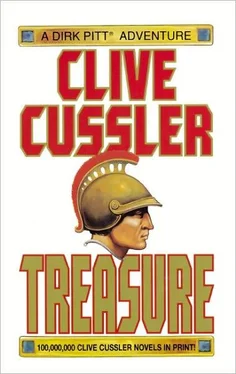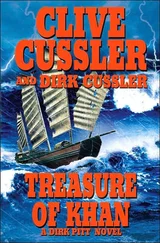Clive Cussler - Treasure
Здесь есть возможность читать онлайн «Clive Cussler - Treasure» весь текст электронной книги совершенно бесплатно (целиком полную версию без сокращений). В некоторых случаях можно слушать аудио, скачать через торрент в формате fb2 и присутствует краткое содержание. Жанр: Старинная литература, на английском языке. Описание произведения, (предисловие) а так же отзывы посетителей доступны на портале библиотеки ЛибКат.
- Название:Treasure
- Автор:
- Жанр:
- Год:неизвестен
- ISBN:нет данных
- Рейтинг книги:3 / 5. Голосов: 1
-
Избранное:Добавить в избранное
- Отзывы:
-
Ваша оценка:
- 60
- 1
- 2
- 3
- 4
- 5
Treasure: краткое содержание, описание и аннотация
Предлагаем к чтению аннотацию, описание, краткое содержание или предисловие (зависит от того, что написал сам автор книги «Treasure»). Если вы не нашли необходимую информацию о книге — напишите в комментариях, мы постараемся отыскать её.
Treasure — читать онлайн бесплатно полную книгу (весь текст) целиком
Ниже представлен текст книги, разбитый по страницам. Система сохранения места последней прочитанной страницы, позволяет с удобством читать онлайн бесплатно книгу «Treasure», без необходимости каждый раз заново искать на чём Вы остановились. Поставьте закладку, и сможете в любой момент перейти на страницу, на которой закончили чтение.
Интервал:
Закладка:
The monitor faded for a moment and then came back with the head and shoulders of a man who was in his late forties.
His face was gaunt and his heavily silvered hair was bare of helmet or cap. The stress of command showed in the lines around the blue eyes.
"Good morning, General," the President greeted him. "I regret I can see you and you can't see me, but there is no camera at this end."
"I understand, Mr. President."
"What is the situation?"
"A heavy rain is just starting to fall, which should prove a godsend for those poor people. They can replenish their water supplies, dust will be dampened, and the stench from their latrines is already beginning to diminish."
"Have there been any provocations?"
"The usual taunts and banners, but no violence."
"from what you can observe, have any of the crowd become discouraged and started drifting back to their homes?"
"No, sir," replied Chandler. "if anything, they're more enthused. They think their Aztec messiah brought the rain, and he's pounded his chest to convince them of it. Groups of Catholic priests have been circulating among the people, preaching and begging them to return to the church and their homes. But Topiltzin's goons quickly escort the good fathers out of town."
"Martin Brogan thinks they'll make their move tonight."
"My intelligence agrees with Mr. Brogan's timetable." The General hesitated before asking the fateful question. "any change in orders, Mr. President? I'm still to stop them at any cost?"
"Until I tell you different, General."
"I must state, sir, you've placed me in a very awkward situation. I cannot guarantee my men will cut down women and especially children if so ordered."
"I'm in sympathy with your position. But if the line is not held in Roma, millions of poor Mexicans will see it as an open invitation to pour into the United States unhindered."
"I can't argue the point, Mr. President. But if we let loose a wall of modern firepower into half a million people jammed shoulder to shoulder, history will convict us of committing a crime against humanity."
Chandler's words triggered the horror of Nazi vileness and the Nuremberg tnals in the President's mind, but he stiffened his resolve.
"Repugnant as the thought is, General," he said solemnly, "the consequences of unaction are unlikely. My National Security experts predict that a wave of self-preservation hysteria will sweep the country, resulting in the formation of vigilante amiies to beat back the flood of illegal immigrants. No Mexican-Americans will be safe. The death toll on both sides could climb to astronomical proportions.
Conservative legislators will rise up and demand Congress vote a formal declaration of war against Mexico. I don't even want to think about what happens after that possibility."
Everyone in the room could clearly see the confusion of conflicting thoughts and emotions that were swirling through the General's mind.
When he spoke it was in a quiet, controlled voice.
"I respectfully request we stay in close communication until the incursion."
"Understood, General," agreed the President. "My National Security advisers and I will gather in the Situation Room shortly."
"Thank you, Mr. President."
The image of General Chandler was cut to a closeup of a small barge being pulled into the water on rollers by nearly a hundred men using ropes.
"Well," said Schiller, shaking his head as if marveling at it all,
"we've done all we can to contain the bomb but failed to keep the explosion from becoming irreversible. Now all we can do is sit by and be consumed."
They came an hour after dark.
Men, women and children, some barely able to walk, all held lighted candles. The low clouds that lingered after the rainstorm glowed orange from the spraw g ocean of flickering flame.
They came in one gigantic swell toward the shoreline, voices slowly rising in an ancient chant. The sound grew from a hum to a loud drone that rolled across the river and cau windows to vibrate in Roma.
Country refugees and city poor, who had abandoned their mud hovels, corrugated tin shacks and cardboard carton shelters in destitute villages or noxious slums, came as one. They were galvanized by Topiltzin's pro se of a new dawning of the once-mighty Aztec empire on former lands in the United States. They were desperate people on the bottom rung of wrenching poverty, driven to grasp at any hope for a better life.
They moved at a snail's pace, one short step at a time to the waiting fleet of boats. They came down the roads that were muddy and puddled from the rain. Small children whined in fear as their mothers carried or led them onto unstable rafts that dipped and bobbed during the boarding.
Hundreds were fo into the river by the crush behind.
Frightened cries came from a multitude of young victims as they were pushed into water over their heads. Many went under or drifted away with the current before they could be rescued, a nearimpossible job, since most of the men were grouped farther to the rear.
Slowly, in disorganized confusion, the hundreds of boats and rafts began to pull away for the opposite shore.
The American Army's floodlights, joined by those of the television crews, brightly illuminated the turmoil swelling across the river.
The soldiers stared in uneasy fascination at the tragedy and the human wall advancing toward them.
General Chandler stood on the roof of Roma's police station in the center of the bluff. His face was gray under the lights, and there was a look of despair in his eyes. The scene was far more appalling than his worst fears.
He spoke into a small microphone clipped to his collar. "Can you see, Mr. President? Can you see the madness?"
President stared fixedly at the huge monitor in the Situation Room.
"Yes, General, the transmission is coming in clearly."
He sat at the end of a long table, flanked by his closest advisors, cabinet members and two of the four Joint Chiefs of Staff. They all gazed at the incredible spectacle that was displayed in stereophonic sound and vivid color.
The fastest boats had touched shore, and their passengers quickly scrambled out. Only when the first wave was fully across and the fleet on its way back for the next passengers did the mob assemble and press forward. The few men who had crossed over were walking up and down the shore with bullhorns, encouraging and urging the women forward.
Clutching their candles and their children while chanting in the Aztec language, the women began scrambling up the bluff like an army of ants gathering around a rock in expectation of joining again on the other side.
The terror-haunted looks of the children and the determined faces of their mothers as they stared into the muzzles of the guns were shown by the cameras. Topiltzin said his divine powers would protect them, and they fervently believed him.
"Good lord!" exclaimed Doug Oates. "The entire first wave is made up of Women and little kids."
No one commented on Oates's alarming observation. The men in the Situation Room watched with growing dread as another crowd of women began to lead their children across the bridge and toward the tanks and armored cars solidly blocking their way.
"General," said the President. "Can you fire a volley over their heads?"
"Yes, sir," replied Chandler. "I've ordered my troops to load blank rounds. The risk of hitting innocent people beyond the town is too great to use live ammo."
"A sound decision," said General Metcalf of the Joint Chiefs. "Curtis knows what he's doing."
General Chandler turned to one of his aides. "Give the command to fire a blank salvo."
The aide, a major, barked into a radio receiver. "Blank salvo, fire!"
The thunderous roar spat a wall of flame into the night. The concussion came like a gust of wind, blowing out many of the candles held by the throng. The ear-splitting clap from the tank cannon and the crackle of small-arms fire reverberated throughout the valley.
Читать дальшеИнтервал:
Закладка:
Похожие книги на «Treasure»
Представляем Вашему вниманию похожие книги на «Treasure» списком для выбора. Мы отобрали схожую по названию и смыслу литературу в надежде предоставить читателям больше вариантов отыскать новые, интересные, ещё непрочитанные произведения.
Обсуждение, отзывы о книге «Treasure» и просто собственные мнения читателей. Оставьте ваши комментарии, напишите, что Вы думаете о произведении, его смысле или главных героях. Укажите что конкретно понравилось, а что нет, и почему Вы так считаете.












